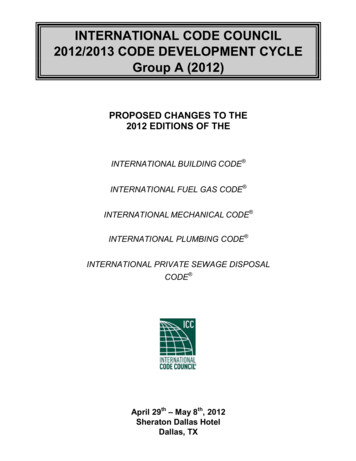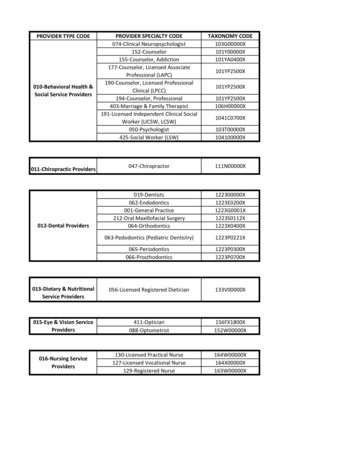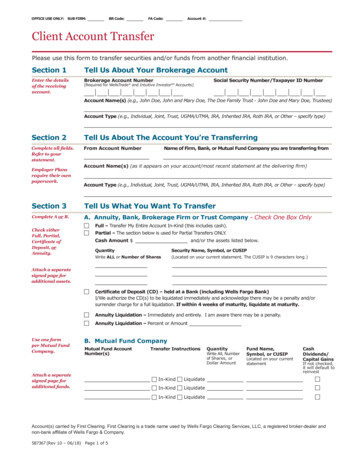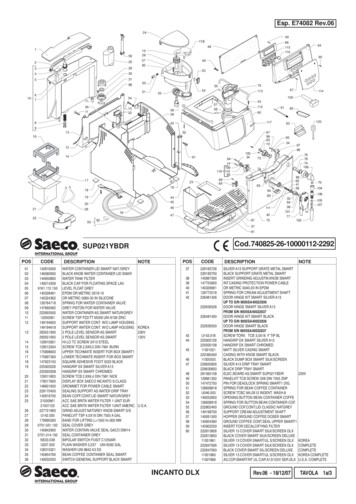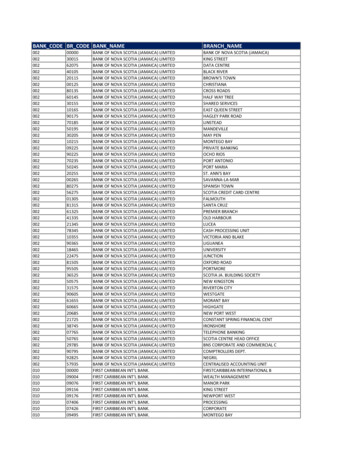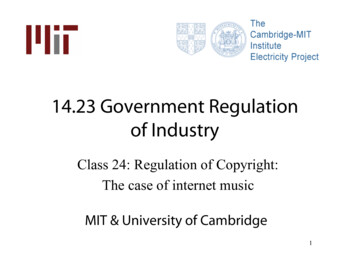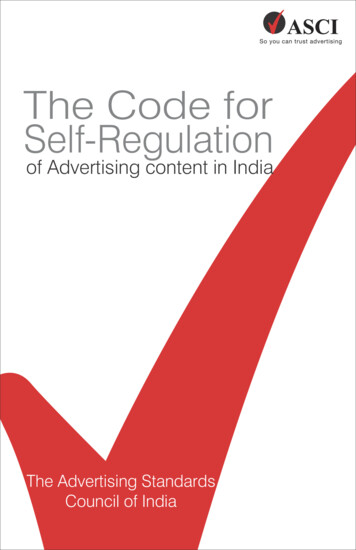
Transcription
The Code forSelf-Regulationof Advertising content in IndiaThe Advertising StandardsCouncil of India
The ASCI Pledge To Advertise With A ConscienceTo my organization, business associates, industryand to society at large, I pledge:To ensureHonesty, TruthfulnessDecency in advertising, Non – exploitation ofvulnerable sections of society especially children,Fairness in competitionI commit myself toAdvertising with a Conscience.
INDEXSr. No. Chapter1.Page No.Introduction12.Truthful & Honest Representation53.Non-offensive to Public84.Against Harmful Products and Situations95.Fair in Competition116.Guidelines for Specific Category Ads137.Self-Regulation Guidelines for AdvertisementsDepicting Automotive Vehicles148.Guidelines for Qualification of Brand ExtensionProduct or Service159.Self-Regulation Guidelines on Advertising of Foods& Beverages (F&B)1610. ASCI Guidelines for Advertising of EducationalInstitutions and Programs1811. ASCI's policy on complaints against Political andGovernment advertisements2112. ASCI Guidelines for Disclaimers made insupporting, limiting or explaining claims made inAdvertisements2313. Validity & Duration of Claiming New / Improved2714. Guidelines for Saving for Large Pack Comparison2815. Guidelines of Advertising for Skin Lightening orFairness Improvement Products2916. Guidelines for Celebrities In Advertising3117. Complaints Procedure3318. Pre Consumer Complaints Council (CCC) MeetingProcedure3419. Complaints from the General Public3520. Intra-Industry Complaints3821. Suo Motu Complaints3922. CCC Meeting Procedure4023. Post CCC Meeting Procedure4324. ASCI Intra Industry, Inter Advertiser Member FastTrack Complaints Handling Procedure4725. Advertising Advice5226. Suspension Pending Investigation (SPI)53
ASCI’s RecognitionsImportant provisions of the Acts of Government of India& Recognition of ASCI Code by Key Stakeholders:The ASCI Code is appended in the Cable Television NetworksRules, 1994, Programme and Advertising Codes prescribedunder the Cable Television Network Rules, 1994Rule: 7 - ‘No advertisement which violates the Code for selfregulation in advertising, as adopted by the AdvertisingStandard Council of India (ASCI), Mumbai, for publicexhibition in India, from time to time, shall be carried in thecable service.’Codes of Advertising issued by Doordarshan acknowledge ASCICodes. (Ref. Page 2, Item No.: 14 )The Department of Consumer Affairs (DoCA) have partnered withASCI to address all complaints pertaining to misleadingadvertisements received on Grievances Against MisleadingAdvertisements (GAMA) portal. (Ref.gama.gov.in)The ASCI Code is appended in the advertising guideline by All IndiaRadio. (Ref. Item No.: 13 )
ASCI’s RecognitionsImportant provisions of the Acts of Government of India& Recognition of ASCI Code by Key Stakeholders:The Food Safety and Standards Authority of India through anMoU has partnered with ASCI to address misleadingadvertisements in the Food & Beverages sector, April 2016.(Ref. fssai.gov.in)AYUSHMinistry of AYUSH through anMoU has partnered with ASCI to coregulate misleading advertisements in the AYUSH sector, January2017. (Ref. ayush.gov.in)ASCI was a Member of the Steering Committee formed by theCentral Government to look into violations of the Cigarettes andOther Tobacco Products (Prohibition of Advertisement andRegulation of Trade and Commerce, Production, Supply andDistribution) Act, 2003(Ref. Ministry of Health and Family Welfare Notification dated, 9thJune 2010, G.S.R. 489 (E))The Drug Controller General of India (DCGI) recognizedSelf-Regulation in Advertising through ASCI’s Code, 2006.
ASCI’s RecognitionsImportant provisions of the Acts of Government of India& Recognition of ASCI Code by Key Stakeholders:Insurance Regulatory and Development Authority Act mentionsadherence for Insurance companies to ASCI Codes.Ref. Item No.: 12 - Adherence to advertisement code — Everyinsurer or intermediary shall follow recognised standards ofprofessional conduct as prescribed by the AdvertisementStandards Council of India (ASCI) and discharge its functionsin the interest of the policyholders.Appended in the Maharashtra Directorate of Technical Education(DTE) ActRef. Item 13 - Every Educational institution shall follow the self– imposed discipline required under the AdvertisingStandards Council of India Code for Self-regulation inadvertising.Transport Department, Government of NCT, Delhi has recognizedthe ASCI CodeRef. Clause 2.3 - All advertisements must comply with the codeof advertising practice issued by the Advertising StandardsCouncil of India.ASCI is a part of a committee constituted by NATIONALHIGHWAYS AUTHORITY OF INDIA (NHAI) along with NCERT,SCERT to regulate the content of automobile advertisements.
ASCI’s RecognitionsImportant provisions of the Acts of Government of India& Recognition of ASCI Code by Key Stakeholders:Supreme Courtof IndiaThe Supreme Court of India (SC), in its judgement dated, 12thJanuary 2017, titled “Common Cause (A Regd. Society) vs. Unionof India and ORS”, affirmed and recognized the self-regulatorymechanism put in place for advertising content by ASCI. (Ref.Supreme Court of India order dated, 12thJanuary 2017)The Supreme Court Committee on Road Safety decided that ASCIand the Society of Indian Automobile Manufacturing (SIAM) towork out a mechanism to telecast only advertisementsconforming to road safety. The Committee also complimentedASCI on the launch of their WhatsApp number for registration ofcomplaints by consumers, and requested Director (Road Safety),Ministry of Road, Transport and Highway to publicize this numberto increase awareness in the public.ASCI’s Code of Self-Regulation in Advertising is appended in thePress Council of India’s Norms of Journalistic Conduct 2010Edition. (Ref. Page 60, Appendix II)The ASCI Code is appended in Indian Broadcasting Foundation’sSelf-Regulatory Guidelines for non-news & current affairsprogrammesRef. Page 19, Item No. 4 - As per the Cable TV Networks(Regulation) Act, all complaints related to advertisementsshall be regulated by Advertising Standards Council of India(ASCI).ICAS to “ASCI as a Key Stakeholder for” section: ASCI is now a partof the Executive Committee of International Council on AdvertisingSelf-Regulation (ICAS), which unites global Self-RegulatoryOrganisations (SROs) and international Industry Associations to forma powerful body that will facilitate the establishment of new SROs inemerging markets, help empower them and provide a platform todiscuss and work on solutions regarding the global challenges facedfor self-regulation in advertising.
ASCI as a Key Stakeholder forBureau of Indian StandardsInter-Ministerial MonitoringCommittee set up by theDepartment of ConsumerAffairs (DoCA)Consumer Online FoundationConsumer Protection CouncilNational Apex Committeefor Stem Cell Researchand Therapy (NAC-SCRT)Department of HealthResearch
ASCI as a Key Stakeholder forInter-Ministerial Committee(IMC) of the Ministry ofInformation and Broadcasting(MIB)ASCI is an importantstakeholder in a 16 memberExpert Committee on High FatSugar and Salt (HFSS) Foodand Sugar Sweetenedbeverages constituted by theMinistry of Health.
717/B, AURUS Chambers, S. S. Amrutwar Marg, Worli, Mumbai 400018, India.Toll Free No.: 1-800-22-2724, Tel: 24955077, 24955076, Fax: 24955071www.ascionline.org, For queries: isocial@ascionlinehttp://linkd.in/1DKOv4lMobile AppASCI ONLINEWhatsapp 91 77100 12345
PURPOSEThe purpose of the Code is to control the content ofadvertisements, not to hamper the sale of products which maybe found offensive, for whatever reason, by some people.Provided, therefore, that advertisements for such productsare not themselves offensive, there will normally be no groundfor objection to them in terms of this Code.This Code for Self-Regulation has been drawn up by people inprofessions and industries in or connected with advertising, inconsultation with representatives of people affected byadvertising, and has been accepted by individuals, corporatebodies and associations engaged in or otherwise concernedwith the practice of advertising, with the following asbasic guidelines, with a view to achieve theacceptance of fair advertising practices in the bestinterest of the ultimate consumer:1FAST TRACK COMPLAINTSHANDLING PROCEDUREDECLARATION OF FUNDAMENTAL PRINCIPLESCOMPLAINTS PROCEDURETHE CODE FOR SELF-REGULATION INADVERTISINGGUIDELINES FOR SPECIFICCATEGORY ADVERTISEMENTSASCI is a voluntary Self-Regulation council, registered as anot-for-profit company under Section 25 of the IndianCompanies Act. The sponsors of ASCI, who are its principalmembers, are firms of considerable repute within the industryin India, and comprise of Advertisers, Media, AdvertisingAgencies and other Professional/Ancillary servicesconnected with advertising practices. ASCI is not aGovernment body, nor does it formulate rules for the public orthe relevant industries.SELF-REGULATION IN ADVERTISINGThe Advertising Standards Council of India (ASCI),established in 1985, is committed to the cause of SelfRegulation in Advertising, ensuring the protection of theinterest of consumers. ASCI seeks to ensure thatadvertisements conform to its Code for Self-Regulation, whichrequires advertisements to be legal, decent, honest andtruthful and not hazardous or harmful while observing fairnessin competition.
THE OBSERVANCE OF THIS CODEI.To ensure the truthfulness and honesty of representationsand claims made by advertisements, and to safeguardagainst misleading advertisements.II.To ensure that advertisements are not offensive togenerally accepted standards of public decency.III. To safeguard against the indiscriminate use of advertisingfor the promotion of products, which are regarded ashazardous to society or to individuals to a degree or of atype and which is unacceptable to society at large.IV. To ensure that advertisements observe fairness incompetition so that the consumer's need to be informedof choices in the marketplace and the canons of generallyaccepted competitive behavior in business is bothserved.The Code's rules form the basis for judgment whenever theremay be conflicting views about the acceptability of anadvertisement, whether it is challenged from within or fromoutside the advertising business. Both the general public andan advertiser's competitors have an equal right to expect thecontent of advertisements to be presented fairly, intelligiblyand responsibly. The Code applies to advertisers, advertisingagencies and media.RESPONSIBILITY FOR THE OBSERVANCE OF THIS CODEThe responsibility for the observance of this Code forSelf-Regulation in Advertising lies with all who commission,create, place or publish any advertisement or assist in thecreation or publishing of any advertisement. All advertisers,advertising agencies and media are expected not tocommission, create, place or publish any advertisementwhich is in contravention of this Code. This is a self-imposeddiscipline required under this Code for Self-Regulation inAdvertising from all involved in the commissioning, creation,placement or publishing of advertisements.This Code applies to advertisements read, heard or viewed inIndia even if they originate or are published abroad, as long asthey are directed to consumers in India or are exposed to asignificant number of consumers in India.2
The Code's rules are not the only ones to affect advertising.There are many provisions, both in the common law and in thestatutes, which can determine the form or the content of anadvertisement.DEFINITIONSFor the purpose of this Code: A product is anything which forms the subject of anadvertisement, and includes goods, services andfacilities. A consumer is any person or corporate body who is likelyto be reached by an advertisement, whether as anultimate consumer, in the way of trade or otherwise. An advertiser is anybody, including an individual orpartnership or corporate body or association, on whosebrief the advertisement is designed and on whoseaccount the advertisement is released. An advertising agency includes all individuals,partnerships, corporate bodies or associations, who orwhich work for planning, research, creation or placementof advertisements or the creation of material foradvertisements for advertisers or for other advertisingagencies.3FAST TRACK COMPLAINTSHANDLING PROCEDUREAn advertisement is defined as a paid-for communication,addressed to the Public or a section of it, the purpose ofwhich is to influence the opinions or behaviour of those towhom it is addressed. Any communication which in thenormal course would be recognized as an advertisementby the general public would be included in this definition,even if it is carried free-of-charge for any reason.COMPLAINTS PROCEDURE THE CODE AND THE LAWThe Code is not in competition with law. Its rules, and themachinery through which they are enforced, are designed tocomplement legal controls, not to usurp or replace them.GUIDELINES FOR SPECIFICCATEGORY ADVERTISEMENTSTHE CODE AND THE LAW
STANDARDS OF CONDUCT4 Media owners include individuals in effective control ofthe management of media or their agents; media are anymeans used for the propagation of advertisements andinclude press, cinema, radio, television, hoardings, handbills, direct mail, posters, internet, etc. Minors are defined as persons who are below the age of18 years. Any written or graphic matter on packaging, whetherunitary or bulk, or contained in it, is subject to this Code inthe same manner as any advertisement in any othermedium. To publish is to carry the advertisement in any media; be itby printing, exhibiting, broadcasting, displaying,distributing, etc.STANDARDS OF CONDUCTAdvertising is an important and legitimate means for the sellerto awaken interest in his products. The success of advertisingdepends on public confidence. Hence, no practice should bepermitted which tends to impair this
The Code's rules are not the only ones to affect advertising. There are many provisions, both in the common law and in the statutes, which can determine the form or the content of an advertisement. The Code is not in competition with law. Its rules, and the machinery through which they are enforced, are designed to complement legal controls, not to usurp or replace them. DEFINITIONS For the .




